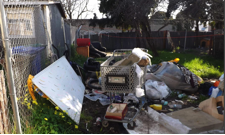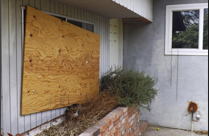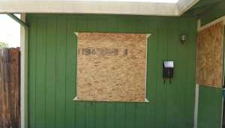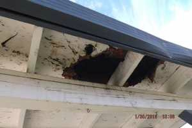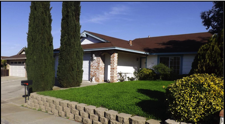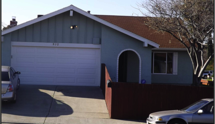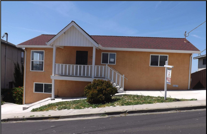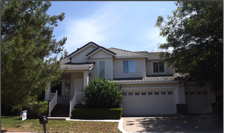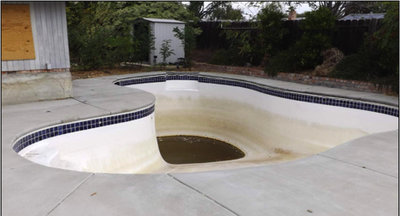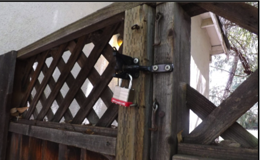|
FOR IMMEDIATE RELEASE February 1, 2018 Contact: Contact: Caroline Peattie, Fair Housing Advocates of Northern California [email protected] - (415) 483-7552 Deutsche Bank, Ocwen Financial, and Altisource Accused of Racial Discrimination in 30 U.S. Metro Areas National Fair Housing Alliance, Fair Housing Advocates of California, and 18 Civil Rights Groups File Federal Lawsuit Over Neglected Foreclosures in Communities of Color PowerPoint available here. Download a PDF version of the press release here. Read the filed complaint here. Today, Fair Housing Advocates of Northern California (FHANC) joined the National Fair Housing Alliance (NFHA) and 18 fair housing organizations from across the country filed a housing discrimination lawsuit in federal district court in Chicago, IL against Deutsche Bank; Deutsche Bank National Trust; Deutsche Bank Trust Company Americas; Ocwen Financial Corp.; and Altisource Portfolio Solutions, Inc. Ocwen and Altisource are the servicer and property management company responsible for maintaining and marketing a large number of Deutsche Bank’s properties. NFHA is filing this lawsuit on the first day of Black History Month to highlight how neglected bank-owned homes hurt African American communities. The lawsuit alleges that Deutsche Bank purposely failed to maintain its foreclosed bank-owned homes (also known as real estate owned or “REO” properties) in middle- and working- class African American and Latino neighborhoods in 30 metropolitan areas, while it consistently maintained similar bank-owned homes in white neighborhoods. The data presented in the federal lawsuit, which is supported by substantial photographic evidence, shows a stark pattern of discriminatory conduct by Deutsche Bank/Ocwen/Altisource in the maintenance of foreclosed homes. The poor maintenance of homes in communities of color resulted in these homes having wildly overgrown grass and weeds, unlocked doors and windows, broken doors and windows, dead animals decaying, and trash and debris left in yards. Deutsche Bank/Ocwen/Altisource are paid and under contract to provide routine maintenance and marketing to these bank-owned homes. This includes regular lawn mowing, securing a home’s windows and doors, covering dryer vent holes and other holes to keep animals and insects from nesting, keeping the property free of debris, trash, branches and weeds, and complying with nuisance abatement ordinances in each city. The lawsuit is the result of a multi-year investigation undertaken by NFHA and its fair housing agency partners beginning in 2010. “We chose to first file administrative complaints with HUD against Deutsche Bank, expecting the bank to review our evidence and implement changes to secure, maintain, and market its bank-owned homes in communities of color to the same standard it did in white neighborhoods,” said Shanna L. Smith, President & CEO of NFHA. “However, even after meeting with Deutsche Bank’s legal counsel in April 2015 and sharing photographs illustrating the significant differences in treatment between homes in African American/Latino and white neighborhoods, we saw no improvement,” Smith continued. NFHA also met with representatives from Ocwen and Altisource and shared photographs illlustrating these problems. No improvements with routine maintenance and marketing issues were identified following those meetings, so NFHA and the 19 fair housing agencies amended the HUD complaint to add these companies. The lawsuit points out that Deutsche Bank-owned homes in predominantly white working- and middle-class neighborhoods are far more likely to have the lawns mowed and edged regularly, invasive weeds and vines removed, windows and doors secured or repaired, litter, debris and trash removed, leaves raked, and graffiti erased from the property. Below are photos of Deutsche Bank’s foreclosed homes from largely non-white neighborhoods that illustrate the result of the neglect of the properties. Deutsche Bank-owned home in a non-white community in Richmond (left) and Antioch (right). Boarded homes, holes in eaves, and bent gutters were just some of the deficits found at this Fairfield home. In contrast, the pictures below show well-kept neighbors’ homes in non-white neighborhoods which are negatively impacted by the foreclosed properties next door. Neighbors’ homes, well maintained, in non-white communities. In predominantly white neighborhoods, on the other hand, Deutsche Bank’s foreclosed properties were better maintained and marketed, as seen in the photos below. Deutsche Bank-owned home in a white community in Benicia (left) and Brentwood (right). “We initially investigated Deutsche Bank’s properties in 2014 in Solano and Contra Costa counties and found really badly maintained properties in communities of color,” said Caroline Peattie, Executive Director of Fair Housing Advocates of Northern California. “Despite Deutsche Bank being on notice about the problems with their foreclosed properties, they still had not been addressed when we investigated properties in 2016 and found similar issues. Again and again, in neighborhoods that were predominantly Latino or non-white, we found Deutsche Bank properties covered in dead grass, missing professional ‘for sale’ signs marketing the home, littered with garbage, and marred by broken or boarded windows, damaged fences, and the like. Even a highly scored property in a majority non-white neighborhood in Vallejo, built in 2004 and in good shape, was completely unsecured, inviting vandals to waltz through the door. That is unconscionable.” NFHA and the 19 partner agencies collected evidence at each property on over 35 data points that were identified as important to protecting and securing the homes. Investigators also took and closely reviewed nearly 30,000 photographs of Deutsche Bank-owned homes to document the differences in treatment between communities of color and white neighborhoods. NFHA conducted repeat visits to several Deutsche Bank-owned homes over the course of the investigation. However, investigators found little or no improvement in maintenance and often found the homes in worse condition. FHANC investigated a total of 22 Deutsche Bank properties in the Vallejo and Richmond metro areas, 5 of which were located in predominantly Latino communities, 13 REOs in a community with a majority of non-White residents and 4 in predominantly White communities. Photos of the properties in the counties of Solano and Contra Costa can be viewed on FHANC’s PowerPoint at here.
The poor appearance of Deutsche bank-owned homes in middle- and working-class neighborhoods of color destroys the homes’ curb appeal for prospective homebuyers and invites vandalism because the homes appear to be abandoned. Additionally, the blight created by Deutsche Bank/Ocwen/Altisource results in a decline in home values for African American and Latino families who live next door or nearby, deepening the racial wealth gap and inequality in America. This is not a new problem for Deutsche Bank. In June 2013, Deutsche Bank, as trustee and owner of record of foreclosed homes, settled a lawsuit with the City of Los Angeles for $10 million after it was accused of allowing hundreds of foreclosed properties to fall into slum conditions, leading to the destabilization of whole communities. In the past, Deutsche Bank has taken the position that as a trustee of the loans that resulted in foreclosure, it has no legal obligation to maintain the properties once they come into Deutsche Bank’s possession. And yet, Deutsche Bank agreed to settle the City’s claims and required its preservation maintenance companies to pay most of the $10 million to resolve that case. Under the Fair Housing Act, trustees are clearly liable for discriminatory activity to the same extent as any other owner of property. NFHA alleges that Deutsche Bank, Ocwen, and Altisource’s intentional failure to correct their discriminatory treatment in African American and Latino neighborhoods—the same communities hardest hit by the foreclosure crisis—can only be seen as systemic racism. Smith stated, “The intentional neglect of bank-owned homes in communities of color devalues the property and the lives of the families living in the neighborhoods around them. The health and safety hazards created by these blighted Deutsche Bank-owned homes affect the residents, especially the children, living nearby.” Smith continued, “It is important to note that Deutsche Bank, Ocwen, and Altisource were all paid to secure, maintain, and market these homes. No one is asking for special treatment of these bank-owned homes; we simply ask that these companies provide the same standard of care for all bank-owned homes, regardless of the racial or ethnic composition of the neighborhood in which they are located.” Stagnant water and overgrown grass, commonly documented at homes where Deutsche Bank is owner of record in African American and Latino neighborhoods through this investigation, are a fertile habitat for mosquitos, rodents, termites, roaches, and other pests. “We found unsecured pools with stagnant water in non-white communities, which is not only a breeding ground for mosquitoes, but also very dangerous for adventurous and curious children,” said Peattie. Pool is unsecured and has stagnant water in a non-white community in Antioch, CA. Pool is maintained and secured by a locked gate in a white community in Brentwood, CA.
In addition, pests often carry diseases such Zika and Hantavirus and present serious health risks to nearby residents. These vermin infestations commonly spread to nearby homes. “To compound these problems,” Peattie adds, “overgrown dead grass and shrubbery pose a fire hazard for homes in California – and we’ve seen the terrible destruction of major fires in the past few months. Bank-owned properties must be properly maintained.” In 2011, NFHA released the first of three reports documenting poor routine maintenance of foreclosed homes in African American and Latino neighborhoods as compared to foreclosures in white neighborhoods. Many photographs of poorly-maintained bank-owned homes were shared. Each report recommended best practices to avoid Fair Housing Act violations. “We truly hoped the release of the reports, which included advice on how to comply with civil rights laws, would change the banks’ behavior,” said Smith. “However, only a few banks reached out for meetings to develop best practices, and Deutsche Bank was not one of them.” The second report was released in 2012 and the last one in 2014. The HUD complaint was filed and then amended to add additional cities and new evidence on the following dates: February 26, 2014; April 30, 2014; August 7, 2014; January 22, 2015; August 5, 2016; February 14, 2017; and July 26, 2017. NFHA and its member agencies are represented by Soule, Bradtke & Lambert and Relman, Dane & Colfax PLLC. What does intentional discrimination look like? http://nationalfairhousing.org/Deutsche-Photos http://nationalfairhousing.org/community-map The Fair Housing Act makes it illegal to discriminate based on race, color, national origin, religion, sex, disability, or familial status, as well as on the race or national origin of residents of a neighborhood. This law applies to housing and housing-related activities, which include the maintenance, appraisal, listing, marketing, and selling of homes. Fair Housing Advocates of Northern California is a non-profit organization serving several Bay Area counties that provides free counseling, enforcement, mediation, and legal or administrative referrals to persons experiencing housing discrimination. Fair Housing Advocates of Northern California also offers foreclosure prevention counseling and pre-purchase education, seminars to help housing providers fully understand fair housing law, and education programs for tenants and the community at large. Fair Housing Advocates of Northern California is a HUD-Certified Housing Counseling Agency. The mission of Fair Housing Advocates of Northern California is to ensure equal housing opportunity and to educate the community on the value of diversity in our neighborhoods. National Fair Housing Alliance Founded in 1988, the National Fair Housing Alliance is a consortium of more than 220 private, non-profit fair housing organizations, state and local civil rights agencies, and individuals from throughout the United States. Headquartered in Washington, D.C., the National Fair Housing Alliance, through comprehensive education, advocacy, enforcement programs, and neighborhood-based community development programs provides equal access to apartments, houses, mortgage loans, and insurance policies for all residents in the nation. The work that provided the basis for this publication was supported, in part, by funding under a grant with the U.S. Department of Housing and Urban Development. The author and publisher are solely responsible for the accuracy of the statements and interpretations contained in this publication. Such interpretations do not necessarily reflect the views of the Federal Government. ###
1 Comment
Susan Steward
5/26/2022 02:44:33 pm
I'm so happy this press-release was issued.
Reply
Leave a Reply. |
Archives
July 2024
|
|

TDD: (800) 735-2922
Se habla español We welcome our site visitors with content in Spanish and Vietnamese. En Espanol TIẾNG VIỆT |
|

